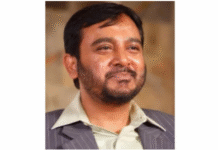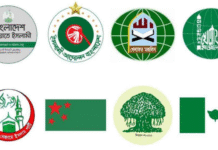The countrywide general strike called by Jamaat-e-Islami protesting at the Supreme Court verdict that upheld the death penalty of war criminal Jamaat-e-Islami leader Ali Ahsan Muhammad Mojaheed was ignored largely across the country on Thursday.
Unlike the previous general strikes called by Jamaat protesting at the war crimes verdicts against the party leaders, Thursday’s hartal saw no violence.
Makbul Ahmad, acting Amir of the party, announced the strike through a statement on Wednesday, moments after the SC order on the review petition of Mojaheed against his death penalty.
No street agitation, picketing and processions were seen in the capital during the hartal while a few numbers of abrupt processions were reported from other parts of the country.
All modes of vehicles plied normally on the capital’s streets while long route buses started leaving Dhaka after 10am. Rail and waterways communications were normal.
Businesses and educational institutions ran normally in the capital and other major cities. Public and private offices worked as usual.
Anti-hartal supporters of Awami League and Ganajagaran Mancha paraded the city roads.
From a procession at Shahbagh, Ganajagaran Mancha spokesperson Imran H Sarker demanded immediate execution of war crimes convicts and imposition of a ban on Jamaat’s politics.
The high security alert, which was put in place from Wednesday ahead of the review petition hearing on the death penalty verdict against the two high profile convicted 1971 war criminals — Salauddin Quader Chowdhury and Mojaheed, continued on Thursday.
The members of law enforcement agencies, including police and Rapid Action Battalion, were seen posted at key points of the capital.
Paramilitary troops of Border Guard Bangladesh were deployed in the capital and the port city of Chittagong.
New Age correspondents across the country including in Chittagong, Khulna, Rajshahi, Sylhet, Rangpur and Barisal reported that no untoward incidents occurred and life was normal during hartal.
Jamaat acting secretary general Shafiqur Rahman in a statement after the hartal claimed that people observed the hartal spontaneously to register their protest against the death sentence to Mojaheed.
He alleged that around 50 leaders and activists were arrested before and during hartal across the country.
Mujaheed, a former social welfare minister, was the president of Jamaat’s erstwhile student front Islami Chhatra Sangha during the Liberation War.
He led the Al-Badr militia that collaborated with Pakistani army to thwart Bangalees’ struggle for freedom.
Al-Badr, led by Mujahid, carried out a massacre to eliminate the country’s intelligentsia.
A special tribunal had sentenced Mujahid to death on July 17, 2013 for the murder of intellectuals and his involvement in the killing and torture of Hindus in 1971.
He had appealed to the top court, seeking review of his death penalty. But a bench led by Chief Justice SK Sinha upheld the tribunal’s verdict on June 16.
The Supreme Court verdict on Wednesday paved the way for execution of Mojaheed.
Source: New Age










